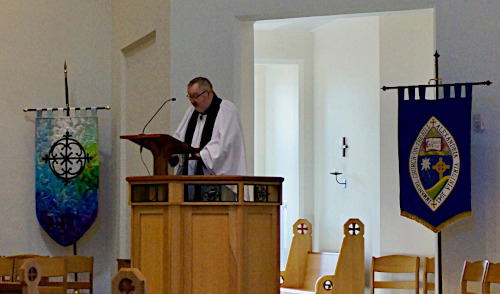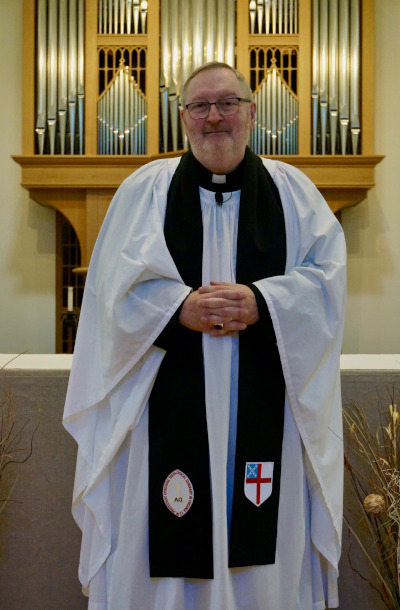Whoever believes in him will not be put to shame . . .
Canon Scott Cowdell, honorary Associate Priest at St Philip’s, O’Connor, preached this sermon while Dean’s Scholar at Virginia Theological Seminary, 2023.
Sermon for Morning Prayer, 27 March 2023
Immanuel Chapel, Virginia Theological Seminary
The Reverend Canon Professor Scott Cowdell, Dean's Scholar.
Psalm 31; Jeremiah 24:1–10; Romans 9:19–33
+ May the words of my lips and the meditations of our hearts be now and always acceptable in your sight, O Lord our strength and our redeemer. AMEN.
“See, I am laying in Zion a stone that will make people stumble, a rock that will make them fall, and whoever believes in him will not be put to shame” (Romans 9:33).
When I was at seminary in the mid-1980s I had a rule for getting the most out of my academic subjects. From the essay topics on offer I always chose whichever would take me closest to the heart of the matter, giving me a chance to explore the key issues. Naturally then, in the course on Paul’s Letters, I chose to write about Paul and the law.
I discovered the influential perspective of English New Testament scholar James D.G. Dunn. For Dunn, interpreting Paul, the law was a gift and blessing from God to beloved Israel, but it became a boast, a badge of honour, a status marker, recalling Rudyard Kipling’s reference to “lesser breeds without the law”. Here’s how we can understand Paul’s key concept: the works of the law, ta erga tou nomou. The work that the law does, in this depleted form that Paul challenges, is to demarcate in group from out group, which is a universal tendency. We justify ourselves by our associations, by our belonging, by the boundaries we erect, by the insidership we jealously protect and by the favoured status we like to signal.
It could be the right look, the right turn of phrase, the right phone, the right friends; it could be the right political agenda, marking us as the righteous. We see it in what Emile Durkheim called functional religion, referring to the defining narratives and practices of whichever group that tie it together anthropologically. So, when Paul talks about justification by works of the law I think of anxious, threatened human beings shoring themselves up against fear of scarcity, diminished status, and especially fear of shame—a key word in our Romans reading.
Instead of all this human business as usual, according to Paul, we’re justified by God’s grace in Jesus Christ, which we discover and make our own through faith. And this changes everything. So, in place of putting others down—in our favourite social media echo chamber or as favoured targets of the angertainment news industry, or indeed at the end of a rope, or with a baseball bat, or a bomb, or just a sick imagination behind a righteous façade—the real sacred breaks in with Jesus Christ. It is the reign of God, a kingdom not made with hands.
Paul announces this break-in for us in our second reading. He starts with tough talk about God’s sovereign power to choose—if Israel could be chosen by God’s sovereign will, then Israel can be unchosen. Now, I’d have to say that this argument rings harsh and hostile to modern ears, and rightly so—we can trace the history of such absolute sovereignty directly from late medieval nominalism to Nietzsche’s will to power, to today’s worrying ascent of nihilism in populist discourse. Instead, the Gospel is about deconstructing this version of sovereignty. And Paul knows that, moving on quickly in today’s Roman’s reading.
Perhaps in Paul’s context there were many who could only grasp the enormity of what he was announcing through the use of such language—as with teenagers and occasionally with parishioners (or curates) you just have to put your foot down and that’s that. But not as a rule for Christians, and not all the time. So, Paul backs off the divine threats in today’s reading and turns to more reasoned argument. He recalls that Israel’s story has always included a place for judgement, with the recalcitrant left behind. Indeed, this is the Deuteronomic theology on display in our Jeremiah passage today: those who take God’s medicine and submit to correction in Babylonian exile are blessed and promised restoration, while those who won’t budge or who try to run from the challenge are unsuccessful, to put it mildly.
But finally in our Romans reading we come to the end and to the point—to the heart of Paul’s gospel. Israel’s striving according to the works of the law is being called out by God, while the remnant of Israel and the Gentiles who turn to God in faith, who go along with Jesus’s breakthrough, will find themselves justified—which of course is the absolute antithesis of anxious, condemning, and ultimately violent self-justification. Here, suddenly, is the good news of the cross: “See, I am laying in Zion a stone that will make people stumble, a rock that will make them fall, and whoever believes in him will not be put to shame”.
The cross of Jesus Christ is this stumbling block, which is God’s great spanner in the works. According to the law, Jesus was a cursed offender, hung shamefully on a tree. To the pure he was impure, to the righteous he was a disgrace, to the self-regarding he was a disquieting figure of shame, to settled and confident insiders he was beyond the pale, the ultimate scorned outsider. But for those who cling to God in hope, to the small and unnoticed, to the defeated, to the victims of abuse who cry out for justice, to the sinners and the addicted and the self-harming and all the others who can’t believe that things could ever be better for them, Jesus Christ crucified is unaccountably, wonderfully revealed in their company as the power of God and the wisdom of God.
Yes, Jesus went to the cross for us, but not to placate an angry God—I reject outright the nihilistic violence of penal substitutionary atonement. Instead, Jesus overcomes evil on the cross, the satanic evil of the system that runs our world on scapegoating violence and calls that justice, or preserving our values, or protecting our children. This is the Easter breakthrough, when God exalted Jesus not only from death but from the shame and defeat that so contribute to death’s sting. And suddenly we see what’s what. Suddenly, with Matthew’s Good Friday account (Matthew 25:52), the graves are opened and the concealed victims of humanity’s sad, self-justifying circus are back for all to see—among them, according to Jürgen Moltmann, “the murdered and the gassed”.1 Moltmann goes on to say this: “Christ’s cross stands between all the countless crosses which line the paths of the powerful and the violent, from Spartacus to the concentration camps and to the people who have died of hunger or who have ‘disappeared’ in Latin America”.2
So, friends, this is where we now find ourselves. We’ve negotiated Paul’s stumbling block, we’ve abandoned the joyless merry-go-round of self-justification to find our place alongside the crucified Jesus, so that our lives can now minister his healing solidarity in the confidence of Easter Sunday—as disciples, as priests and would-be priests, as pastors and teachers. In light of all that, what might we expect? Jürgen Moltmann does not sugar coat it:
The signs of the sanctification of the church and its members are in a particular way the signs of its suffering, its persecution because of its resistance …. The saints who were revered by the church in a particular way were the martyrs, who in the visible fellowship of the crucified Jesus testified to his invisible glory.3
Now, friends, this may not be what you signed up for. But increasingly it’s what you’re going to get, and especially in today’s United States, if you dare to take up the prophet’s mantle. Happily, though, we can find some reassurance in today’s psalm—in fact, you should flag Psalm 31 in your prayer book and turn to it when the time comes for you to pay the price for your faithfulness: “In you O Lord have I taken refuge, let me never be put to shame” (Psalm 31:1, BCP). Because if you’ve got Paul’s message, if you’ve been liberated from self-justification, if you’ve given up having to prove yourself, if you’ve learned the countercultural art of boasting in nothing but the cross of Jesus Christ, then you’ll have passed beyond the fear of shame. Then you’ll be able to serve with calmness, courage, and resilience for a lifetime, leading other Christians along the road less travelled.

+ And now to him who is able to do more abundantly than we can either ask or imagine, according to his power at work in us, to him be glory in the Church and in Christ Jesus unto all generations, now and forever. AMEN.
. . . . . . . . . . . . . . . . . . . . .
1. Jürgen Moltmann. The Crucified God: The Cross of Christ as the Foundation and Criticism of Christian Theology. Translated by R. A. Wilson and John Bowden (London: SCM, 1974), 278.2. Ibid., 45.
3. J¨rgen Moltmann. The Church in the Power of the Spirit: A Contribution to Messianic Ecclesiology. Translated by Margaret Kohl (New York: Harper & Row, 1977), 355.
